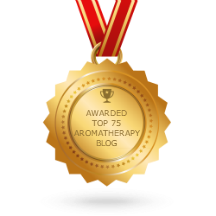When, three days in a row, people email us variations of the same inquiry, it is time to write about it.
This week the inquiries take the form of " My (fill in relationship) has been diagnosed with / is battling (fill in the type or organ) cancer. Which of your Frankincense oils will be most helpful, and how should we administer it?"
And the messages make me want to cry. This is the answer...followed by the science, followed by my opinion.
Almost any of our Frankincense oils can provide valuable emotional and spiritual support to your relative and to those who love him/her. Either by diffusion, or, properly diluted, in a hand or foot massage, Frankincense has a long history of proven value. Personally I would reach for our Boswellia Carterii CO2 extracted because the CO2 extracts contain a powerful anti-depressant component, Incensole acetate, not found in significant amounts in the distilled essential oils. But that is personal taste.
Please note that I said "emotional and spiritual support." A brief tour of the internet will show a LOT of research on the effects of specific Frankincense extracts and components on various strains of cancer cells in a petri dish in a laboratory. Most of the success stories concern the effect of Boswellic Acid, a component of Frankincense Resin. The problem is, Boswellic Acid is NOT a volatile component of the resin. It does NOT distill over into the essential oil. There is NO Boswellic Acid in Frankincense Essential Oil nor in CO2 Extracted Frankincense oil. At one time a large marketing company made claims that their Frankincense EO did contain this substance. After a couple of years of these misleading claims the founder of the company himself wrote a letter to their affiliates explaining that Boswellic Acid is not present in their essential oil. There are many published studies showing the effectiveness of various alcohol extractions of Frankincense Resin against various strains of cancer cells. I have seen some research indicating that Frankincense oil, *in a petri dish, in a lab* may have an effect on a specific strain of bladder cancer cells. There is other research showing that certain components of Myrrh oil may be even more effective on specific strains of breast, cervical, and/or lung cancer cells. (Why do we not see marketers recommending Myrrh Oil for cancer? Perhaps they don't have as much of it to sell.?)
Long story short: the leap from experimental success in a petri dish in a lab to being actually able to effect the growth of cancer cells in human or animal tissue is huge.
I wish I could tell you that one of our products can or could reverse the growth of a cancerous tumor in a loved one. What I can do is offer products that may give emotional support, perhaps ease some pain and discomfort, perhaps lift the spirits.
And...my personal belief? I believe that there is a special place in Hell reserved for those who will give false hope to the suffering in order to increase their profits.
I wish I could give you a different answer. But there is not one.
Thursday, May 7, 2015
Subscribe to:
Post Comments (Atom)



10 comments:
Thank you for posting this. I think people have realized that aromatherapy only provides emotional and spiritual support in cancer situations, but it's still important to have an expert clarify. This is why I think aromatherapy is such a necessary branch of medicine. The more people understand it, the fewer misunderstands and rumors there will be. http://www.omshanticollege.com.au/about
Marge, Is myrrh safe to use while breastfeeding?
Marge thank you for your honesty and your knowledge.
Thank you a million times over. I cannot tell you how many times I was glibly told to ingest Frankincense oil "because it kills cancer without side effects!". The fact that there has never been the vaguest hint of even quasi-research on Frank and my type of cancer didn't matter. The fact that my cancer has done extensive damage to the lining of my stomach so throwing essential oils in there isn't a great idea just had them say (sadly, shaking their head at my obstinance) that I could just rub the Frank on the bottom of my feet then, and it would probably still work. I do realize that people mean well and want to help, but yikes, I shudder to think of the damage going on out there.
Heather Young, I'm sorry, but Tisserand says that Myrrh MAY be fetotoxic due to the beta-elemene and furonodient content, and is contraindicated via all routes during pregnancy and lactation.
Thanks for this. I read that I could get rid of skin growths and moles by putting frankincense oil on them. It has not worked at all. The other thing recommend was oregano oil, but even diluted that stings too much. I've had some success shrinking said growth with rosemary verbena, but it is still significant. It looks like skin cancer and after reading this I am going to just go to the dermatologist.
I would either ignore them (most go away over time of their own accord) or go to a dermatologist. The proposed remedies would do more harm then good. sorry!
Are some of the compounds found in Frankincense Essential Oils still pain relieving and/or anti-inflammatory? I see so many claims from individuals and other essential oil companies of Frankincense, usually Boswellia Serrata, having a great effect on arthritis, inflammation, nerve pain, etc.
Yes, of the various Frankincense oils, Boswellia serrata is supposed to be by far the most anti-inflammatory. However, there are other oils that have stronger anti-inflammatory effects... Helichrysum italicuum, german chamomile, Mango-ginger CO2 extract for starters...
Post a Comment